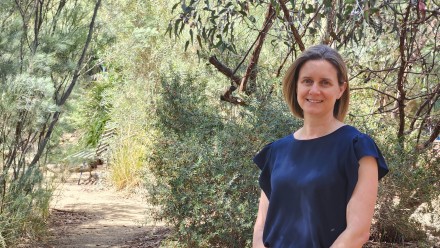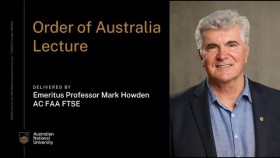Climate change, classrooms, and critical conversations: Secondary teacher becomes ANU Visiting Fellow
“Surreal and humbling” are the words Sharon Forwood uses to describe the feeling of being appointed as a Visiting Fellow to The Australian National University (ANU) Institute for Climate, Energy and Disaster Solutions (ICEDS). Sharon is a first for ICEDS, a Visiting Fellow who is a practicing schoolteacher, bringing practical experience and connections with her regional Australian community into the heart of our national university.
Sharon is a Geography teacher at Kildare Catholic College in Wagga Wagga, NSW. She reached out to ICEDS in 2022 because she felt that she needed support to effectively teach about climate change in her classroom. “I’ve been teaching about climate change for a long time, but for me there is a clear increase in the level of student concern around it, and the questions that students are asking now are a lot heavier.” Sharon feels that there is a cognitive dissonance between students’ exposure to regular climate change content in their social media, and the lack of real conversations happening in many school contexts.
“They know that it’s a huge crisis, and we need to bring schools into alignment with what students know to be real.”
Tanja Russell is a PhD candidate with the ANU Crawford School of Public Policy who shares Sharon’s concerns. Tanja’s PhD looks at students’ experiences of climate education, and she feels that in an “increasingly fraught and complicated” information ecosystem, the ability to have critical, evidence-based conversations at school is essential. Tanja notes that the many points of intersection between her work and Sharon’s led to fascinating discussions, and eventually to the development of a partnership to explore climate change education and student wellbeing.
While Sharon might feel she is the lucky one in this partnership, the benefits and learning go both ways. Tanja believes that we need more people like Sharon involved in the university’s work. “I think that being open to working with communities and community experts can only bring broader benefits and better solutions informed by multiple perspectives.”
Dr Bec Colvin, a Senior Lecturer at the ANU Crawford School of Public Policy, who has also been working with Sharon since the project’s inception, adds that these partnerships offer value well beyond the sum of the partners.
“It is at these spaces of intersection between ways of knowing, thinking and doing that we often find the most generative approaches to challenging and important questions.”
One of the key challenges the partnership is working to address is that teachers who haven’t studied climate change often find it challenging to negotiate complex climate conversations in the classroom, and relevant professional development opportunities are scarce. Sharon feels that teachers need access to more up-to-date information about climate change to integrate into their teaching, support from each other and from within their institutions to feel confident in speaking about climate change, and to feel comfortable discussing climate change impacts and opportunities with students in a way that supports student wellbeing.
Ultimately, Sharon believes that good climate education is about teaching students to listen to each other and engage in respectful dialogue about challenging issues. Tanja adds that teachers like Sharon are so important not just for teaching students the science of climate change, but for giving students the space to think about what climate change means for them. “This means supporting students to confront their anxieties, normalising students’ completely rational concerns, helping them see that they are not alone in their responses, then providing hope and opportunities for individual and collective action.”
Sharon and ICEDS’ early work with Kildare Catholic College has seen teachers become much more comfortable talking about climate change in the staffroom and the classroom, and so the team is now looking to expand their reach to other schools by co-designing and running the first Climate Essentials for Teachers program in December 2023. Bec notes that this program will not only focus on providing teachers with up-to-date climate science but will also help them prepare students to process misinformation and disinformation, policy, technology change, human behaviour, and more, all whilst carefully navigating the legacy of a politically contentious past.
Sharon adds that as we face an acute and growing teacher shortage, and teachers struggle with low morale and motivation, the chance to engage in conversations with global leaders in climate science will help to validate and demonstrate the importance of the work they do in school classrooms around Australia.
“Teachers are highly skilled professionals, and when they’re confident and comfortable with what they’re teaching they can do amazing things that suit their own individual contexts. The Climate Essentials for Teachers course is about creating a platform where teachers can find that confidence.”
Tanja’s hope is that this initial Climate Essentials for Teachers course will be the “first step in a longer path to helping teachers access what they need to do climate education really well in the classroom.” Sharon would like to see the course nationally accredited so that teachers around the country can benefit, while Bec hopes that teachers who participate in the course can capitalise on the opportunity to develop supportive peer networks for sharing experiences, resources and insights. Wherever this path leads, a partnership between Sharon and her Wagga community, and the team at ANU and ICEDS, is a chance to rethink the way academia and practitioners can work together to achieve outcomes beneficial for all.
Written by Ali Thwaites.











